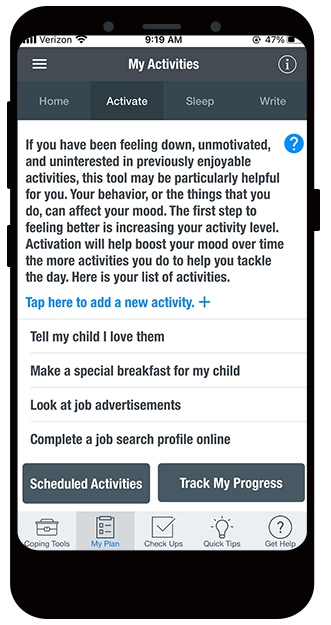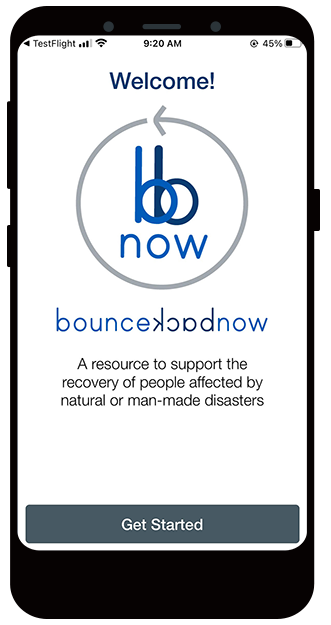Bounce Back Now
Bounce Back Now (BBN) is a free app designed to improve the emotional health of adults and families affected by a disaster, such as a hurricane, tornado, flood, earthquake, or mass violence incident.
App Store Google Play

About BBN
The Bounce Back Now (BBN) team is committed to supporting the emotional recovery of people affected by a disaster, such as a hurricane, tornado, flood, earthquake, or mass violence incident. Many people experience stress, anxiety, low mood, or sleep problems after a disaster, but don’t know where to turn for help. This app will help you track your emotional recovery and will provide you with coping tools to help you manage stress, anxiety, mood, and sleep. If you want to talk to or text a disaster crisis counseling and support specialist, the BBN app will help to connect you. BBN was developed by healthcare professionals at the Medical University of South Carolina, Boston University, and University of Nebraska and was rigorously tested in research to provide an effective recovery tool for disaster survivors worldwide. BBN is available in English and Spanish.
Click the video to see how BBN works
Research and Development:
BBN was developed by experts in clinical psychology, psychiatry, computer science, and public health and tested in two large studies with over 2,500 adults and teenagers affected by the 2011 tornadoes in Joplin and Alabama as well as Hurricanes Harvey, Irma, Maria, Florence, and Michael. These studies were funded by the National Institutes of Health. The app modules are based on best practice strategies and guidelines for reducing post-disaster mental and behavioral health symptoms.
Here is a list of research publications from our team:
- Ruggiero, K. J., Resnick, H. S., Acierno, R., Carpenter, M. J., Kilpatrick, D. G., Coffey, S. F., Ruscio, A. M., Stephens, R. S., Stasiewicz, P. R., Roffman, R. A., Bucuvalas, M., & Galea, S. (2006). Internet-based intervention for mental health and substance use problems in disaster-affected populations: A pilot feasibility study. Behavior Therapy, 37, 190-205.
- Kilpatrick, D. G., Koenen, K., Ruggiero, K. J., Acierno, R., Galea, S., Resnick, H. S., Roitzsch, J., Boyle, J., & Gelernter, J. (2007). The serotonin transporter genotype and social support and moderation of posttraumatic stress disorder and depression in hurricane-exposed adults. American Journal of Psychiatry, 164, 1693-1699.
- Acierno, R., Ruggiero, K. J., Galea, S., Resnick, H. S., Koenen, K., Roitzsch, J., de Arellano, M., Boyle, J., & Kilpatrick, D. G. (2007). Psychological sequelae resulting from the 2004 Florida hurricanes: Implications for post-disaster intervention. American Journal of Public Health, 97, S103-S108.
- Ruggiero, K. J., Amstadter, A., Acierno, R., Kilpatrick, D. G., Resnick, H. S., Tracy, M. & Galea, S. (2009). Social and psychological resources associated with health status in a representative sample of adults affected by the 2004 Florida hurricanes. Psychiatry, 72, 195-210.
- Amstadter, A. B., Broman-Fulks, J. J., Zinzow, H., Ruggiero, K. J., & Cercone, J. (2009). Internet-based interventions for traumatic stress-related mental health problems: A review and suggestion for future research. Clinical Psychology Review, 29, 410-420.
- Ruggiero, K. J., Resnick, H. S., Paul, L. A., Gros, K., McCauley, J. L., Acierno, R., Morgan, M., & Galea, S. (2012). Randomized controlled trial of an Internet-based intervention using random-digit-dial recruitment: The Disaster Recovery Web project. Contemporary Clinical Trials, 33, 237-246.
- Ruggiero, K. J., Gros, K., McCauley, J. L., Resnick, H. S., Morgan, M., Kilpatrick, D. G., Muzzy, W., & Acierno, R. (2012). Mental health outcomes among adults in Galveston and Chambers Counties after Hurricane Ike. Disaster Medicine and Public Health Preparedness, 6, 26-32.
- Price, M., Gros, D. F., McCauley, J. L., Gros, K. S., & Ruggiero, K. J. (2012). Nonuse and dropout attrition for a web-based mental health intervention delivered in a post-disaster context. Psychiatry: Interpersonal and Biological Processes, 75, 266-283.
- Pietrzak, R. H., Tracy, M., Galea, S., Kilpatrick, D. G., Ruggiero, K. J., Hamblen, J. L., Southwick, S. M., & Norris, F. (2012). Resilience in the face of disaster: Prevalence and longitudinal course of mental disorders following Hurricane Ike. PLoS One, 7, e38964. doi:10.1371/journal.pone.0038964.
- Davidson, T. M., Price, M., McCauley, J. L., & Ruggiero, K. J. (2013). Disaster impact across cultural groups: Comparison of Whites, African Americans, and Latinos. American Journal of Community Psychology, 52, 97-105.
- Price, M., Davidson, T., Andrews, J. O., Ruggiero, K. J. (2013). Access, use, and completion of a brief disaster mental health intervention among Hispanics, African Americans, and Whites affected by Hurricane Ike. Journal of Telemedicine and Telecare, 19, 70-74.
- Adams, Z. W., Sumner, J. A., Danielson, C. K., McCauley, J. L., Resnick, H. S., Gros, K., Paul, L. A., Welsh, K. E., & Ruggiero, K. J. (2014). Prevalence and predictors of PTSD and depression among adolescent victims of the Spring 2011 tornado outbreak. Journal of Child Psychology and Psychiatry, 55, 1047-1055.
- Ruggiero, K. J., Price, M., Adams, Z., Stauffacher, K., McCauley, J., Danielson, C. K., Knapp, R., Hanson, R. F., Davidson, T. M., Amstadter, A. B., Carpenter, M. J., Saunders, B. E., Kilpatrick, D. G., & Resnick, H. S. (2015). Web intervention for adolescents affected by disaster: Population-based randomized controlled trial. Journal of the American Academy of Child and Adolescent Psychiatry, 54, 709-717.
- Price, M., Yuen, E. K., Davidson, T. M., Hubel, G., & Ruggiero, K. J. (2015). Access and completion of a web-based treatment in a population-based sample of tornado-affected adolescents. Psychological Services, 12, 283-290.
- Ruggiero, K. J., Davidson, T. M., McCauley, J., Gros, K. S., Welsh, K., Price, M., Resnick, H. S., Danielson, C. K., Soltis, K., Galea, S., Kilpatrick, D. G., Saunders, B. E., Nissenboim, J., Muzzy, W., Fleeman, A., & Amstadter, A. B. (2015). Bounce Back Now! Protocol of a population-based randomized controlled trial to examine the efficacy of a web-based intervention with disaster-affected families. Contemporary Clinical Trials, 40, 138-149.
- Yuen, E. K., Gros, K., Welsh, K., McCauley, J., Resnick, H., Danielson, C. K., Price, M., & Ruggiero, K. J. (2016). Development and preliminary testing of a web-based, self-help application for disaster-affected families. Health Informatics Journal, 22, 659-675.
- Danielson, C. K., Sumner, J. A., Adams, Z. W., McCauley, J. L., Carpenter, M., Amstadter, A. B., & Ruggiero, K. J. (2017). Adolescent substance use following a deadly U.S. tornado outbreak: A population-based study of 2,000 families. Journal of Clinical Child and Adolescent Psychology, 46, 732-745.
- Cohen, G. H., Tamrakar, S., Lowe, S., Sampson, L., Ettman, C., Linas, B., Ruggiero, K. J., & Galea, S. (2017). Comparison of simulated treatment and cost-effectiveness of a stepped care case-finding intervention vs usual care for posttraumatic stress disorder after a natural disaster. JAMA Psychiatry, 74, 1251-1258.
- Grolnick, W. S., Schonfeld, D. J., Schreiber, M., Cohen, J., Cole, V., Jaycox, L., Lochman, J., Pfefferbaum, B., Ruggiero, K. J., Wells, K., Wong, M., Zatzick, D. (2018). Improving adjustment and resilience in children following a disaster: Addressing research challenges. American Psychologist, 73, 215-229.
- Cohen, G.H., Tamrakar, S., Lowe, S., Sampson, L., Ettman, C., Kilpatrick, D., Linas, B., Ruggiero, K., Galea, S. (2019). Improved social services and the burden of posttraumatic stress disorder among economically vulnerable people after a natural disaster: A modelling study. The Lancet Planetary Health, 3, e93-e101.